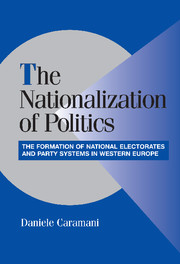 The Nationalization of Politics
The Nationalization of Politics Published online by Cambridge University Press: 02 December 2009
In spite of the general trend toward the nationalization of party systems described in the previous chapter differences between countries in regard to the levels of territoriality of voting behavior have not disappeared. In some countries, territorial politics plays an important role to this day. In other words, although there are common factors leading to the nationalization of all party systems (state formation and democratization processes leading to a predominantly functional dimension), there are also factors that differentiate them.
To explain cross-country differences this chapter uses factors that vary between countries, that is, differentiated pathways and types of nation-building. Chapter 5 has identified three main sources of deviation from the main nationalizing trend: (1) religious differentiation, (2) agrarian structures, and (3) ethnoregional defense. However, it has also been shown that agrarian politics declined after World War I both as a factor of territorialization within countries and differentiation between countries. The main agrarian parties have transformed into center parties and have not caused relevant differences in the levels of nationalization between countries since World War II. This chapter therefore focuses on the first and third sources of deviation. The different trajectories of formation of the nation-state that distinguish European countries caused the survival of preindustrial cleavages such as ethnolinguistic, religious, and regional cleavages in several systems.
Cultural heterogeneity has a direct impact on nationalization levels, as it translated into a number of highly territorialized cleavages.
To save this book to your Kindle, first ensure no-reply@cambridge.org is added to your Approved Personal Document E-mail List under your Personal Document Settings on the Manage Your Content and Devices page of your Amazon account. Then enter the ‘name’ part of your Kindle email address below. Find out more about saving to your Kindle.
Note you can select to save to either the @free.kindle.com or @kindle.com variations. ‘@free.kindle.com’ emails are free but can only be saved to your device when it is connected to wi-fi. ‘@kindle.com’ emails can be delivered even when you are not connected to wi-fi, but note that service fees apply.
Find out more about the Kindle Personal Document Service.
To save content items to your account, please confirm that you agree to abide by our usage policies. If this is the first time you use this feature, you will be asked to authorise Cambridge Core to connect with your account. Find out more about saving content to Dropbox.
To save content items to your account, please confirm that you agree to abide by our usage policies. If this is the first time you use this feature, you will be asked to authorise Cambridge Core to connect with your account. Find out more about saving content to Google Drive.